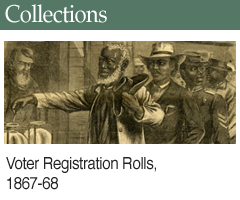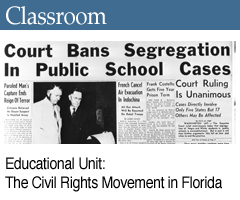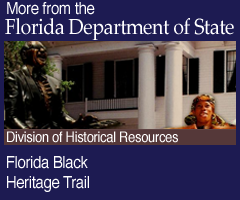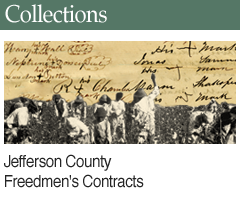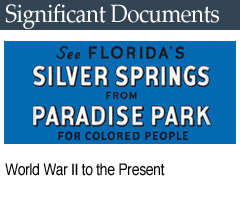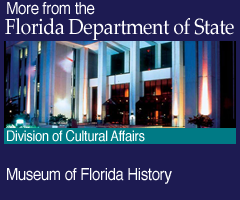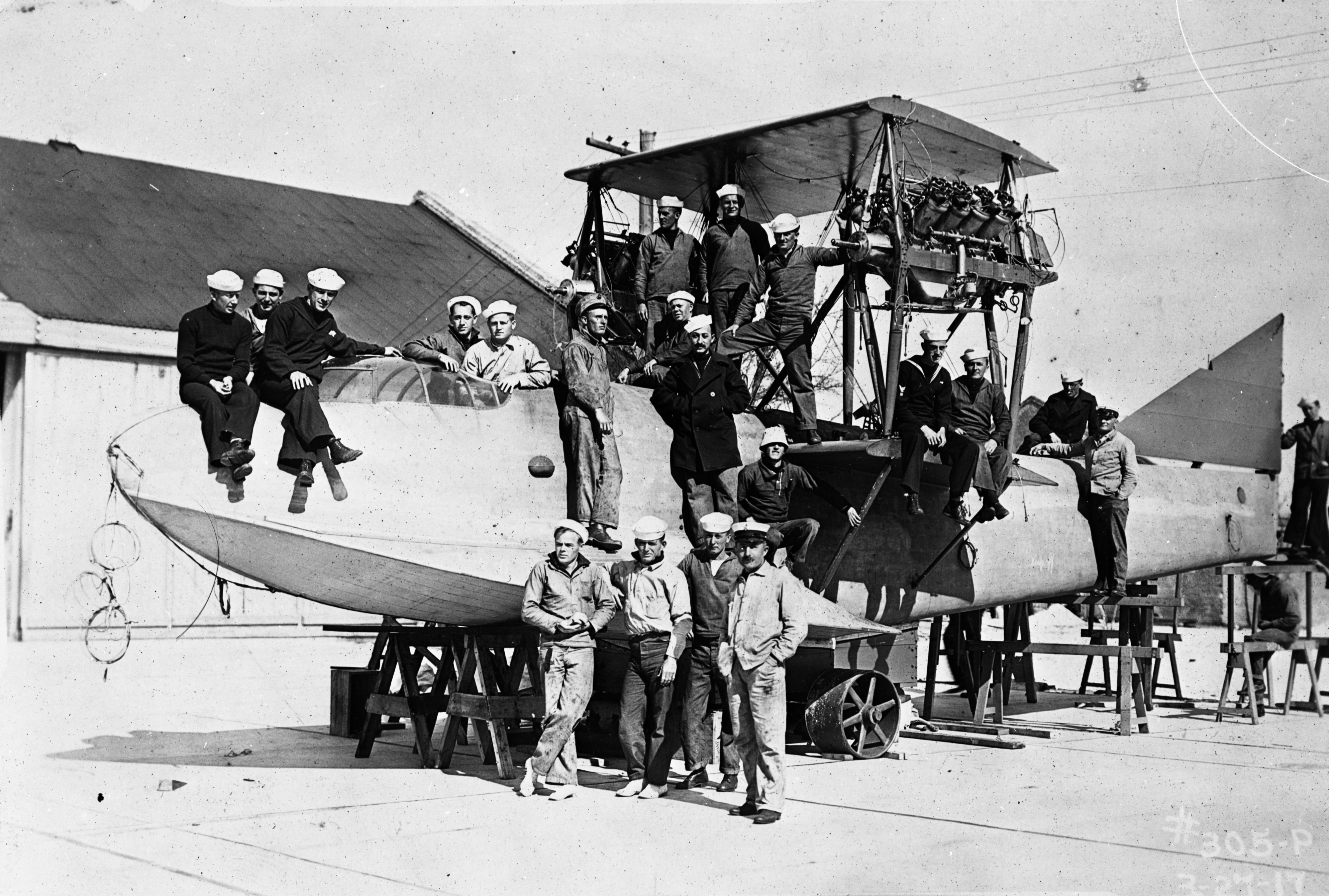Guide to African American Resources in the State Library and Archives of Florida
Manuscript Collections
Manuscript collections are unpublished materials created and donated to the State Archives by private individuals and their families or by non-governmental businesses and organizations. The collections described below represent the lives and experiences of Black Floridians, their families and businesses, professional and fraternal organizations, slavery and emancipation, segregation and the civil rights movement, and arts and culture. Please note that the original terminology used by the creators of these records may be harmful or offensive. That terminology is being retained where necessary to accurately represent the original intentions of the creators and the historical context of the records.
For ease of access, this guide divides the manuscript collections into three categories: Black Creators and Voices, Non-Black Creators and Hidden Histories.
Black Creators and Voices
The following collections consist of the personal and professional papers of Black individuals and families and Black-owned businesses and organizations, as well as oral histories and interviews with Black professionals, artists, politicians and other influential members of Florida’s Black population. Records cover subjects such as church involvement, civil rights activism and segregation, tourism, folklife, history and politics. The collections in this section were created and donated by Black persons or are records in which Black persons relate their experiences in their own words, providing the most unfiltered accounts possible from the State Archives’ collections of the Black experience in Florida.
M77-164
Junior League of Tallahassee (Tallahassee, Florida) Oral Histories, 1976-1977
0.75 cubic foot, 30 cassettes
In 1976 and 1977, the Junior League of Tallahassee conducted a series of oral history interviews with prominent Tallahassee residents, including football coach Alonzo Smith “Jake” Gaither of Florida Agricultural and Mechanical University and Lettie Proctor Hill of the John Proctor family. This collection contains the oral history recordings and interview transcripts produced as part of that project.
M86- 27
Joseph E. Lee Papers, 1876-1920
2 cubic feet
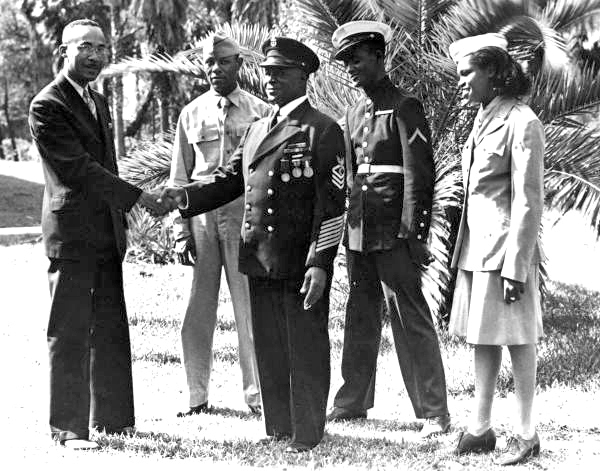
Administrator of Bethune-Cookman College with WWII vet and students. (State Archives of Florida / PR00769)
Joseph E. Lee was a prominent Black attorney, federal officeholder and Republican Party official from Jacksonville, Florida. The papers in this collection document his tenure as Deputy Collector of Customs and Deputy Collector for Internal Revenue, his association with the Florida Republican Party and his legal and personal affairs. Political papers include correspondence, minutes of Republican State Conventions, resolutions and delegate rolls. Collector of Customs and Collector of Internal Revenue papers contain correspondence, receipts and schedules. Legal papers document his Duval County law practice.
M95-2
Daniel M. Williams Biographical Records on Mary McLeod Bethune, 1890-1960
1.25 cubic feet
This collection consists of records documenting the life of Mary McLeod Bethune, including transcripts of interviews with Bethune, letters, and drafts of sections of Daniel Mortimer Williams' planned biography. The records document the Daytona School and Bethune-Cookman College, as well as Bethune's involvement with the National Council for Negro Women. The collection includes a transcript of an interview conducted in about 1940 by Dr. Charles Spurgeon Johnson, an authority on race relations who chaired the Sociology Department and was later the first Black presidentat historically Black Fisk University. Also included are 30 photographs that depict Bethune, her Daytona Beach schools and Bethune Cookman College.
M95-3
Eunice Liberty Papers, 1967-1995
2 cubic feet
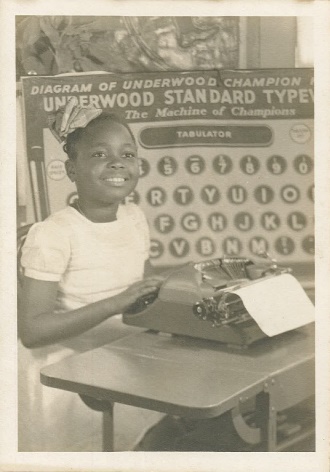
Young student at typewriter. (State Archives of Florida / Collection M95-3)
Eunice Liberty (1904-2001) was a teacher with Miami-Dade Public Schools for nearly 40 years and successfully advocated for the inclusion of Black history in the school curriculum after she retired. She served on the National Council of Negro Women (NCNW) and was a proponent of educational reform, campaigning for schools and a multi-cultural children’s community center in honor of Mary McLeod Bethune.
This collection contains correspondence, articles and speeches, newspaper clippings, programs and background materials on the NCNW, photographs and other records relating to Eunice Liberty from 1967 to 1995. Some records relate to her efforts to establish the children’s community center and her successful campaign to establish a Black Archives in Miami.
M96-24
Leona H. Cooper Papers, 1948-1996
2 cubic feet
Leona Cooper (née Ferguson), a microbiologist and Bahamian native, was very involved in the Catholic Church and was a major advocate for Black Catholics and various social issues. This collection includes correspondence, newspaper clippings, photographs, programs, publicity materials and other materials documenting her activities and interests. Subjects within the collection include the St. Martin De Porres Association and Black Christians in the Catholic Church; women in the Catholic Church; the Archdiocese of Miami; defending the rights of Haitian immigrants and Haitian nationals; the visit of Pope John Paul II to America in 1987; and City of Coral Gables and Dade County government and business.
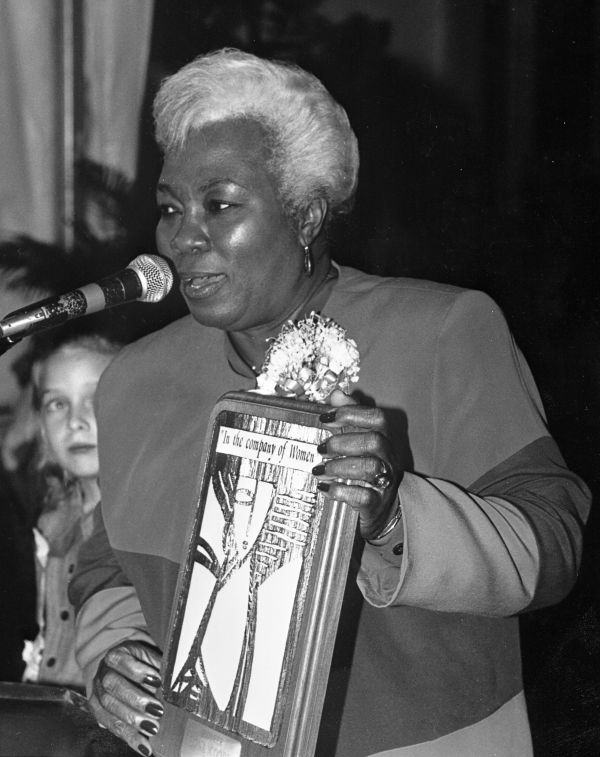
Leona Helen Ferguson Cooper - recipient of "In the Company of Women" award. (State Archives of Florida / N035284)
M97- 21
WLRN (Radio Station: Miami, Florida) "Straight Talk With Audrey Finkelstein" Civil Rights Radio Series Audio Cassettes, 1997 7 audio tapes, 7 compact discsIn 1997, public radio stations around the United States aired "Will the Circle be Unbroken?" a nationally syndicated series about the American civil rights movement. To complement this series, host Audrey Finkelstein of WLRN, a South Florida public radio station, developed a six-part series about South Florida's struggle for desegregation for her weekly half-hour interview program. This collection comprises seven audiocassette recordings featuring conversations with some of the individuals, Black and white, who took part in South Florida's struggle for racial integration.
M98-5
Dr. Patricia Clements Oral History Interviews, 1997-1998 8 compact discsThis collection consists of oral history interviews conducted by Dr. Patricia Clements with Florida women active in public life and/or community affairs, including Black microbiologist and Catholic Church and community activist, Leona Cooper. The interviews discuss each woman's family background, education, careers, home life and personal philosophies.
N2000-25
Coral Gables Cable TV Division Coral Gables Oral History Interviews, 2000
2 items (1/2" videotapes)This collection consists of videotaped oral history interviews with long-time Coral Gables residents and city officials, produced by the City of Coral Gables Cable Television Division to commemorate the 75th anniversary of the city’s incorporation. Topics addressed include life in early Coral Gables, economic development, segregation, the Civil Rights Movement, and women's rights movements.
N2008-6 James Stoutamire Wakulla Springs Boat Tour Recording, 1969 1 compact disc (10.7 megabytes)
Tom Gavin, Jr. worked as a boat driver and tour guide at Wakulla Springs. His family worked at the park back to the early 1900s. Gavin is credited with creating the story of “Henry the Pole-Vaulting Fish,” a tale and song invented to accompany particular fish sightings along the glass-bottom boat tours. This recording of one of Gavin’s glass bottom boat tours was made in December 1969 by graduate student Jim Stoutamire for a linguistics course at the University of Missouri-Columbia.
N2011-4
Roger S. CrawfordWakulla Springs Boat Tour Recording, 1971 1 compact disc
Luke “Old Lou” Smith served as a boat driver and guide at Wakulla Springs for more than 30 years, ferrying visitors along the river in glass-bottom boats. Smith’s tours were characterized by trivia and jokes, interspersed with singing. This is a sound recording of "Old Lou" conducting a glass bottom and jungle boat tour in April 1971, recorded by Roger Crawford for the Tallahassee Chamber of Commerce.
N2012-12 Christian Hospital Papers, 1920-1994 0.1 cubic footBonnie M. Busch established Christian Hospital in 1918 after the city-owned Jackson Memorial Hospital refused to treat a Black maid in her employ. Busch donated $5,000 and five acres of land to start a hospital that served the Black residents of Miami and the Overtown community until it closed in 1982. The collection documents the history of Christian Hospital and Black physicians in Miami-Dade County. Records include news articles, hospital literature, photographs, a 1994 reunion souvenir book and a historical summary of the hospital.
N2013-3
John Gilmore Riley Foundation Inc. John G. Riley House & Museum Papers, 1979-1987 0.4 cubic footThis collection documents the establishment and activities of the John Gilmore Riley Foundation, particularly the Foundation's efforts to preserve the John G. Riley House and develop it as a museum and research center. The collection includes bylaws; articles of incorporation; Riley House property transfer and ownership records; insurance and financial records; applications for historical status of the house; and early publicity materials for the John G. Riley House & Museum.
N2014-2
Shack Madison Gardner General Store Ledgers, circa 1903-1908, 1915-1917, 1921 3 volumes, 1 photograph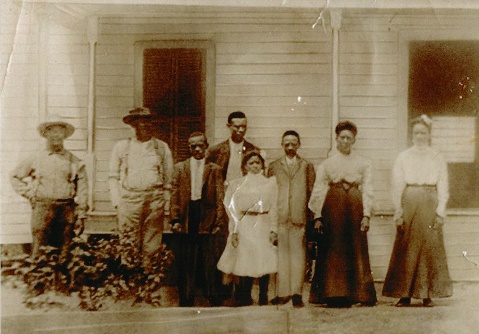
Shack Gardner and wife, Rose, along with several unidentified family members. (State Archives of Florida / Collection N2014-2)
This collection consists of three ledger books from the Gardners’ General Store in Barrow Hill in east Leon County. The ledgers document purchases and accounts from 1903 through 1921 and include dates of sale, customer names, purchased items, costs and payments received. An index is located at the beginning of each ledger. The ledgers are evidence of economic conditions of a Black businessperson in the early 20th century.
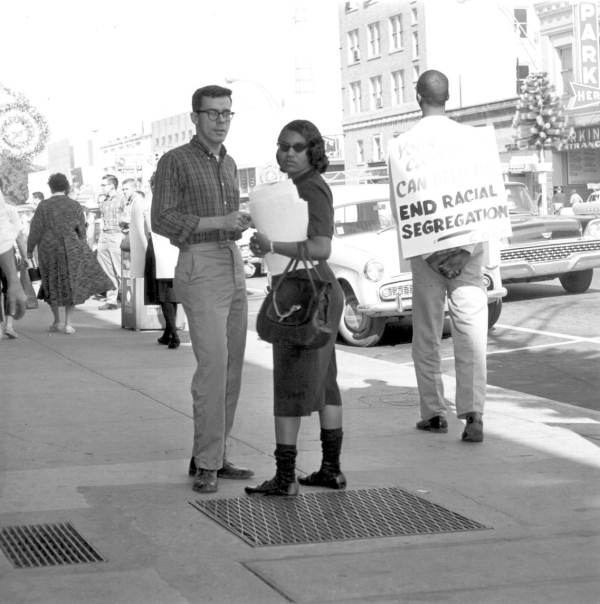
Patricia Stephens picketing at downtown Tallahassee businesses. (State Archives of Florida / RC12397G)
Patricia Stephens Due was a Black educator, public speaker, author and life-long civil rights proponent. This collection documents the personal life and public activities of Patricia Stephens Due and her relationships with family and friends throughout her life. Most prominent in the collection are letters between Due and her sister, brother, parents and other family members, friends, fellow civil rights activists, and supporters and opponents of her civil rights efforts.
N2015-7
Bernyce Hall Clausell Clausell Family Papers, 1932-2015 8 cubic feetReverend Dr. Bernyce Clausell was the first female minister in Florida, a civil rights activist and co-founder of Calvary Baptist Church in Tallahassee with her husband, James. This collection documents the public life and activities of Reverend Clausell and contains her personal files, home videos, day planners and materials commemorating her career. The collection also includes programs and minutes from the First Bethlehem Missionary Baptist Association and many of James Clausell's sermons from the 1930s-40s given at churches in North Florida and South Georgia.
N2016-2
John G. Riley Masonic Charters, 1902, 1908, 1946, 1974 4 itemsThe collection contains the original Masonic charter issued to John G. Riley on February 15, 1902, that validates his election as the first Excellent High Priest of St. James Chapter Number 26. Also included are a second charter establishing the Venus Court No. 65 of the Heroines of Jericho in 1908, and two Letters Patent of Perpetual Constitution which established the John G. Riley Consistory, No. 207, in 1946 and reorganized it in 1974.
N2016-6
Peter B. Gallagher Seminole Tribe and Florida Folk Festival Promotional Video Recordings, circa 1990s 37 video tapesThe collection consists of video recordings documenting Seminole, Black and Latino/Latina history and traditions and Florida Folk Festival performers. Of relevance are recordings of the Cracker Trio, comprised of jazz and blues musicians Tommy Walton, Blind Willie James and Diamond Teeth Mary McClain; Afro-Brazilian folksinger Angela Patua; poet and storyteller Ajamu Mutima; artist and Yoruba folklorist Onabamiero Osunlade Ogunleye; and Haitian storyteller, herbalist and cooking instructor Liliane Nerette Louis.
N2017-66
Tony Proctor Papers, 1847-1848, 1855 0.25 cubic footAntonio "Tony" Proctor (ca. 1743-1855) served as an interpreter between the United States government and Seminole tribes in the 1820s. He was enslaved at birth in Jamaica and brought to America to serve as a body servant to an English officer in the Seven Years War, serving in this position again during the American Revolution. After finishing his service, Proctor settled in St. Augustine and purchased his freedom. He continued his military service under General Andrew Jackson during the Seminole Wars and other conflicts, remaining in Florida until his death at the approximate age of 112 years. This collection consists of copies of records documenting Proctor's service as an interpreter for the United States government in the 1820s and efforts to receive payment for his work. Also included in this collection is a typescript of a Florida Sentinel article regarding Proctor’s death in Tallahassee in 1855.
N2017-131
Gavin Family Papers, 1884-1949 2.25 cubic feetThe collection documents the personal lives and social activities of a Black family residing in Wakulla County from the 1880s through the 1940s, with the bulk of the collection relating to James G. Gavin, a ship worker and farmer. Records include correspondence, legal documents, records of the Republican Party in Wakulla County, and materials from James Gavin’s fraternal activities, among other subjects.
N2020-5
Maxwell VanHoeij Oral History Interview with Congressman John Lewis, 2016 2 electronic files (0.084 gigabytes)The collection consists of an oral history interview with Congressman John Lewis conducted by Maxwell VanHoeij, an eighth-grade student at Cobb Middle School (Tallahassee), on December 12, 2016. Conducted as part of VanHoeij’s project for the 2016-2017 Florida History Day competition, the interview focuses on Congressman Lewis’ account of Rev. Martin Luther King, Sr., and the civil rights movement.
Non-Black Creators
The following collections consist of personal and professional papers of non-Black Floridians, funeral and church records, and organizational records of various Florida social, professional and business groups. Together, these records provide information on the Black experience in Florida from the Spanish period to the present, including religion, education, family life and genealogy, business practices, military involvement, civil rights and the experiences of freed and enslaved Black persons before, during and after the slavery period and the Civil War. Created by non-Black individuals or organizations, these records might not accurately represent the experience and perspective of Black Floridians but may provide some additional context for that experience. Of value for researchers are records that provide vital statistics, such as birth, death and marriage information, which can be found not only among collections of church and burial records, but also in records of enslavers. Please note that records in this section may contain outdated or offensive language, which is reflective of the circumstances in which they were created and is maintained in collection descriptions to provide researchers with the most accurate context for the records contained therein.
M72-10
Cathedral of Saint Augustine (Saint Augustine)
Records, 1594-1763
7 microfilm reels
The collection contains a microfilm copy of the records of the Cathedral of St. Augustine, which includes baptisms, marriages, burials and confirmations. Of interest are baptisms and burials of freedmen, enslaved Black persons and "mixed bloods," typically referring to those of indigenous and Spanish descent.
M74- 5
Saint Michael's Catholic Church (Pensacola) Records, 1811-1956 4 microfilm reelsRecords of Saint Michael's Catholic Church include baptisms (1880-1953), baptisms of free and enslaved Black persons (1817-1882), marriages (1811-1937), burials (1841-1956) and confirmations (1884-1931).
M74-21
Blessed Sacrament Catholic Church (Tallahassee) Records, 1847-1878, 1908-1941 1 microfilm reelRecords of the Blessed Sacrament Catholic Church include a list of Catholics in Chattahoochee, Quincy, St. Marks, New Port, Tallahassee, Monticello and Madison; a register recording confirmations, baptisms, marriages and burials; names of Black persons baptized from 1851 to 1864; and a summary of financial accounts from 1864 to 1865.
M76-126
J. L. Reed and Son Funeral Home (Tampa) Burial Records, 1887-1969 16 microfilm reelsThe collection contains a microfilm copy of the burial records of the J. L. Reed and Son Funeral Home and the funeral record books of M. Lovengreen and J. L. Reed. Records include the deceased’s name, date and cause of death, place of burial, nationality, birthplace, occupation and parents’ names.
M76- 134
Joshua Hoyet Frier Memoirs, 1895-1903 0.25 cubic footThe collection contains a photocopy of a journal of reminiscences written by Joshua Hoyet Frier, a member of the 1st Florida Reserves, Company B. It is titled “Reminiscences of the War Between the States by a Boy in the Far South at Home and in the Rank of the Confederate Militia.” Some topics discussed are secession, food shortages and Frier’s everyday war experiences. A chapter titled, “The Negro as a Slave,” includes a description of a hunt for Dick, an enslaved Black man, for alleged theft.
M79-178
Concord Missionary Baptist Church (Madison County) Records, 1841-1868 0.25 cubic footThis photocopy of the minute book of the Concord Missionary Baptist Church contains the minutes of the regular conference meetings of the church, including the reception of new members; membership lists of white and Black members; and lists of those members baptized at the church.
M79-180
B. Marion Reed Funeral Home (Tampa) Burial Records, 1916-1928 4 microfilm reelsBurial records of the B. Marion Reed Funeral Home describe deceased persons by name, race, birthday, birthplace, date of death, occupation and marital status. Each volume contains an alphabetical index by surname.
M79-181
Woodlawn Cemetery (Tampa) Burial Records, 1895-1969 2 microfilm reelsBurial records of the Woodlawn Cemetery include records of interment and a sexton’s register. Records describe the deceased by name, sex, race, place and date of birth, date and cause of death, attending physician, undertaker, date interred and location of grave. Volumes II through VI contain alphabetical indexes by surname.
M79-182
Swilley Funeral Home (Tampa) Burial Records, 1959-1970 2 microfilm reelsBurial records of the Swilley Funeral Home describe the deceased by name, death date, sex, race, marital status, birthplace, age at death, occupation, birthplace, citizenship status and the name and occupation of the deceased’s parents. Also included are a selection of death notices and certificates.
M79-183
Lord and Fernandez Funeral Home (Tampa) Burial Records, 1925-1969 17 microfilm reelsBurial records of the Lord and Fernandez Funeral Home identify the deceased by name, closest relative, race, place of birth and death, address, death date, parental information and funerary information. Some volumes contain indexes organized alphabetically by surname. A fire destroyed all records prior to 1925. In addition, the collection includes records from Stowers Funeral Home, also of Tampa, which contain the same types of information and range from 1961 to 1966.
M79-184
Wells Funeral Home (Plant City) Burial Records, 1918-1927, 1939 1 microfilm reelRecords of Wells Funeral Home identify the deceased by their name, race, birthplace, birth and death date, occupation, and parents’ names and birthplaces.
M81-6
William T. Bauskett Papers, 1911-1917 1.75 cubic feetThe collection consists primarily of research materials and some correspondence relating to an unpublished manuscript of a history of Florida by William Bauskett. The history spans the 1770s through the early 20th century. The chapters cover the scope of Florida's history, with significant documentation of Indian affairs, Andrew Jackson and the Civil War. Records contain information on the "Slave Trade of 1828" and a report on the destruction of the occupied “Negro Fort” on the Apalachicola River, a general rendezvous for refugees from slavery and disaffected indigenous persons. The collection also includes documentation relating to the enlistment, participation and treatment of "colored troops" during the Civil War.
M81- 17
Florida Bar Florida Legislative Investigation Committee Records, 1957-1960 0.75 cubic footThe Florida Legislature established the Florida Legislative Investigation Committee, commonly referred to as the Johns Committee, in 1956 to investigate allegedly subversive activities and legal infractions by educational institutions, suspected communist organizations and groups involved with the civil rights movement, including the National Association for the Advancement of Colored People (NAACP). In 1957, the committee held a series of public hearings in which they tried to prove that the NAACP and its Florida counsel were breaking the law. This collection consists of carbon copies of transcripts of hearings before the Johns Committee from February 4 to March 13, 1957. There is an abundance of material relating to investigations of five NAACP attorneys: Alexander Akerman, Jr. of Washington, D.C.; Horace E. Hill of Daytona Beach, Florida; Grattan E. Graves, Jr. of Miami, Florida; and Francisco A. Rodriguez and William Andrew Fordham, both of Tampa, Florida. The records include correspondence, reports, complaints and legal documents relating to the investigation and the organization’s activities in Florida.
M85- 10
Sallie G. Bradford Walnut Hill Plantation Record of Enslaved Births and Deaths, 1860-1876 1 volumeThe collection consists of a register recording the names and dates of birth of enslaved Black persons on Thomas A. Bradford’s Walnut Hill Plantation. Thomas’ niece, Sallie, started the register and an unknown source continued it after her death in 1867.
M86-38
Elliot family Papers, 1851-1957 0.75 cubic footThe collection consists of the personal papers and business records of the Elliot family, including Frederick R. Cotten, Henry S. Elliot, Sallie Cotten (Elliot), Fred C. Elliot, and Carrie Elliot. The Frederick R. Cotten records include a plantation journal that lists 19 enslaved Black persons by name, a receipt for the purchase of 35 enslaved Black men and women, and an advertisement for a debate about the participation of Black men in politics. Additionally, one folder contains a copy of a letter written by Lenn, an enslaved man in Lunnenburg City, Virginia, to his sister, Memory, in Tallahassee.
M87-20
Papers Concerning the Will of Zephaniah Kingsley, 1844, 1846 2 itemsThe collection contains two documents contesting the will of Zephaniah Kingsley, an enslaver and plantation owner with multiple wives and substantial land holdings in Clay and Duval counties. At the time of his death, Zephaniah left most of his estate to his primary wife, Anna Kingsley, born Anta Madjiguene Ndiaye; three secondary wives, Flora Kingsley, Sarah Murphy Kingsley and Munsilna McGundo; and all his children by these marriages. White members of Kingsley’s family contested the will, arguing that it was not legally recognizable to leave property to enslaved or freed Black persons, especially women, and that his marriage to Anna was invalid because of her race. Included in this collection is a petition to the will made by Martha McNeill and others to Judge Farquhar Bethune, filed November 30, 1844, and the executors' response (Benjamin A. Putnam and Kingsley B. Gibbs) to the petition of Anna M. J. Kingsley, widow of Zephaniah Kingsley, dated September 5, 1846.
M88- 28
Joseph C. Shaw Papers, 1863-1910 3 cubic feetThis collection contains the private and official papers of Joseph C. Shaw, a white soldier who served during the Civil War as a commissioned officer in the United States 99th Colored Troops. Originally named the 15th Regiment Corps d’Afrique, the 99th was a unit of Black enlisted men and white officers that campaigned in Louisiana. This unit served in the expedition that resulted in the Battle of Natural Bridge along the St. Marks River, six miles from present-day Woodville, and made up part of the occupying forces in Florida until it mustered out of service in 1866. The collection provides information on the administration of a Black Union military organization along with details concerning conditions in the Civil War and in the immediate post-Civil War period in Florida.
M93-5
Spanish Florida Censuses, 1783-1814 1 microfilm reelThis microfilm contains copies of transcribed translations of East Florida censuses from the Second Spanish Period in Florida. Included are the 1783 Spanish Census of Florida; the 1786 St. Augustine census, taken by Father Hassett; a 1793 St. Augustine census by street with a name index; and an 1814 census of various areas in East Florida, including Pablo and Fernandina; Talbot, Amelia and Shell Islands; St. Mary, St. Johns and Nassau Rivers; and the Spanish Mosquito Territory.
M96-4
Bay County Genealogical Society Burial Records, 1858-1995 1 microfilm reelThis collection consists of the information recorded from the headstones of cemeteries and the burial records of the Brake Funeral Home. Headstone information, recorded between 1990 and 1995, contains genealogically relevant information from 38 cemeteries in Bay County, including four Black cemeteries – Gainer, Hillside, Lynn Haven Community and Redwood. The earliest dated headstone appears to be 1858. Records from Brake Funeral Home include the deceased’s name, place of residence, age, date of death, race and remarks by funeral home staff. The records include 114 Black individuals, including five unidentified persons.
M9711
Reminiscences about Memory Adams, not dated 2 itemsThis collection consists of two handwritten anecdotes about Memory Adams, a Black woman born to enslaved parents in 1822. Adams was brought to Florida in her 20s and auctioned off to an enslaver named John Argyle. While enslaved by the Argyle family, Adams taught herself to read and write by helping the Argyle children with schoolwork. She was emancipated at the end of the Civil War. She worked as a house and office cleaner for wealthy white families in Tallahassee, which afforded her some opportunities not granted to the majority of the newly freed Black Tallahassee community, such as attending and having her funeral service at the white Trinity Methodist Church and traveling to the 1893 Chicago World’s Fair.
M97- 15
John D. Gray
Deed of Trust, 1841 1 item
This 1841 deed of trust between John D. Gray and his older brother, William, uses John’s St. Joseph properties and enslaved persons as collateral for a financial loan. Included in the deed are the names, ages and trades of 12 persons enslaved by John Gray.
N2003-2
Florida News Service Reporters Lee Mainella and Bill Burke's Master Story Video Tapes, 1982-2000 222 Beta video tapesThe Florida News Service (FNS) was a television news service created by journalists Lee Mainella and Bill Burke in 1982. FNS supplied stories about the state's capital, Florida's government and major political issues to 11 Florida television stations until the company folded in 1991. Burke continued his journalism career with the Florida News Network until 2002. In addition to public figures, this collection includes footage of Tallahassee residents and local events, Apalachicola fishers and shrimpers, death row inmates, Florida State University and Florida A&M University students, Florida artists and protesters.
N2015-6
School Desegregation Papers, 1956-1970 0.25 cubic footReverend Charles Kenzie Steele, President of the Inter-Civic Council, and four other parents filed a class-action suit on March 2, 1962, in federal district court against the Leon County School Board. The lawsuit charged the Board with operating an illegally segregated school system. This collection contains records regarding desegregation in Florida and the stance of the Leon County Board of Public Instruction regarding this issue from 1956 to 1970. The records also document the division between Black and white schools throughout Florida prior to desegregation, primarily in Leon, Palm Beach, Escambia and Orange counties.
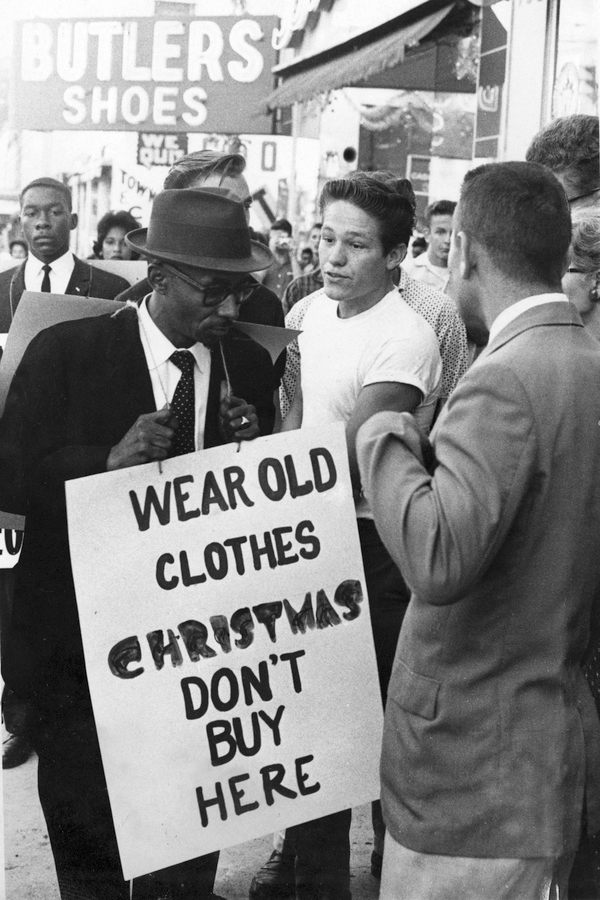
Rev. C.K. Steele picketing downtown stores during demonstration in Tallahassee. (State Archives of Florida / DUE056)
N2017-23
George A. Dekle Papers, 1843-1873 1 folderThe collection comprises materials related to George Austin Dekle, a farm owner and enslaver who moved to Marianna in the mid-1860s. Included in the records are seven bills of sale for enslaved Black persons from Florida, Georgia and Virginia, which list the names, relationships and some ages of the enslaved individuals, as well as to whom, where and when their enslavement was transferred.
N2017-82
Aaron Tison Deed, 1834 1 itemThe collection includes a property deed from Aaron Tison, a Columbia County settler, to John C. Richard, dated March 8, 1834. The deed includes cattle, horses, a wagon and six enslaved persons, all identified by name and age, and described as either Black or “mulatto,” indicating a mixed-race person.
N2017-114
E. C. Cabell Bill of Sale for Enslaved Persons Joannah, Jeff and Sarah, 1842 1 itemEdward Carrington Cabell was the first United States Representative from Florida, holding his position from 1845 to 1853, and served as a Lieutenant Colonel in the Confederate States Army. The collection contains a single bill for the sale of three named enslaved Black persons from a public auction in Quincy, which was overseen by Commissioners E. C. Cabell and C. H. Dupont.
N2017-116
David G. Raney Tax Records, 1859 1 folderDavid G. Raney was a merchant and enslaver in Apalachicola where he ran a dry goods store with his partner, George Washington Harris, and held several public offices. The collection includes records of Raney’s taxable property for 1859, which includes 12 enslaved Black persons.
N2017-130
John Bellamy Letter, 1826 1 folderJohn Bellamy was an enslaver and plantation owner in Monticello. In 1823, he won a bid to complete the eastern half of a road meant to connect Pensacola to St. Augustine, for which the United States Army contracted him. This section of road, known as “Bellamy’s Road,” was completed in May 1826 with enslaved Black labor and the assistance of indigenous guides. This collection contains photostats of a letter from Bellamy to Brigadier General Thomas S. Jesup that discusses the conclusion of the construction project. Note that while this letter discusses the use of forced labor, it does not specify the names or number of enslaved persons involved.
N2020-1
Estates of Elisha H. Kendall and Clark D. Parks Account Ledger, 1841-1878 1 volumeThe collection consists of a single volume documenting the distribution and maintenance of property and financial assets of the estates of Elisha H. Kendall of Georgia and, later, of Clark D. Parks of Florida. Both estates contain records of enslaved Black persons. Kendall’s estate describes numerous sales and purchases of enslaved persons and their families, detailing the names and relations of each person, to whom their enslavement was transferred, and the date and cost of the transfer. The Parks estate consists entirely of an inventory and appraisement, in which are listed 23 enslaved Black persons identified by first name, gender and age.
Hidden Histories
The following collections consist of family and personal papers, business and organization files, and various other records created by non-Black individuals throughout Florida’s history. These collections are not primarily related to the Black experience but contain small amounts of relevant records. Descriptions for each collection indicate the general nature of the collection and information of relevance within the collection. This section is intended to provide greater awareness of and access to records of Black lives in Florida’s history which might otherwise be overlooked due to the size and scope of the collection of which they are a part. For example, Simpson Family Papers (Collection M91-5) contains over 8 cubic feet of records but has only one folder of records pertaining to Black persons. Hidden histories often contain valuable information for researchers and genealogists, particularly regarding vital statistics of enslaved persons and their descendants.
M72-7
Gamble Family
Family History Notes, 1898
1 microfilm reel
This notebook contains a family history of the Gambles and transcriptions of documents relating to events in the family's past. Included is a narrative account of the burning of Tallahassee in 1843, which refers to Nelson, a Black man enslaved by John Gamble, who assisted in controlling the spread of the fire.
M74-22
Edmund Cottle Weeks Papers, 1854-1935 4 cubic feet, 11 volumesThe collection contains the papers of Major Edmund Cottle Weeks and his second wife, Elizabeth (Hunt) Weeks, as well as materials relating to the Weeks, Craft, Hunt and Fish families. Many of Weeks’ papers relate to his term as a U.S. Marshal, during which time he attempted to protect freedmen and their sympathizers from the extreme hostility they often faced.
M75-78
Cotten Family Papers, 1840-1925 10 itemsPapers of the Cotten family of Leon County include a receipt for the purchase of an unnamed 44-year-old enslaved person.
M82-10
Forbes Purchase Collection, 1817-1910 1.25 cubic feetWilliam Panton, John Leslie and Thomas Forbes owned Panton, Leslie & Company, a large and prosperous merchant business in colonial Georgia and South Carolina. The collection contains correspondence and legal papers concerning litigation over land ownership as well as receipts, indentures and other agreements made by interested parties.
Some of the legal records document enslaved Black individuals. Box 1, Folder 3 documents a civil suit regarding 29 unidentified enslaved Black persons willed to Sarah A. Betton by her deceased husband in 1845. Box 2 contains the will of William Oliphant which includes enslaved persons transferred to his relatives; a lawsuit against Thomas Gaskins for the cruel treatment of Sam, an enslaved man; a lawsuit against William Burney for the theft of 11 named enslaved persons from William Tradewell; an appraisal of enslaved persons and perishable property of the estate of Col. Alfred M. Galtin; and an assignment of power of Galtin’s estate to his wife, Sarah, which identifies 29 enslaved persons by name and age.
M82-59
Florida Centennial Celebration Program, 1924 1 itemThis collection contains a Tallahassee program for the 1924 Florida Centennial Celebration. The celebration consisted of a week of events related to the history of Tallahassee as the Capital City. The program gives hour-by-hour details of events for each day of the week except for Saturday, November 15, 1924, simply titled “Negro activities day.”
M83-27
Taylor Family Papers, 1850-1969 1 cubic footThis collection contains the papers of the Taylor family of Leon and Wakulla counties and various related families. The collection includes correspondence from 1852-1960; the account book of Charles Theodore Taylor, 1873; the journal of Mary C. Taylor, 1920; and genealogical papers and photographs, including some tintypes. Additionally, the collection contains the journal of Elizabeth L. Taylor, which records over 17 births and 10 deaths of enslaved Black persons at Black Creek, her family’s plantation in Duval County.
M83-28
Charles W. Bannerman Journal of the Iamonia Plantation, 1837-1873 1 microfilm reelThe collection contains a microfilm copy of the journal of Charles Bannerman’s Iamonia Plantation in Leon County. The journal includes an account ledger and daily record of the plantation’s operations.
M84-3
Kingsley Beatty Gibbs Journal, 1840-1843 1 volume, 1 microfilm reelKingsley Beatty Gibbs was the nephew of Zephaniah Kingsley, a Fort George Island enslaver. He purchased his uncle’s plantation in March 1839 and was named co-executor of his estate in 1843. Gibbs’ journal, written from notes in 1858, spans January 1840 to June 1843. Some entries discuss the lives and conditions of enslaved Black persons on the plantation, including 40 individuals enslaved by Gibbs as part of the purchase agreement for the land.
M84-25
Veterans of Foreign Wars of the United States, Leon County Post No. 3308 (Tallahassee) Records, 1946-1963 1 cubic footThis collection contains the records of the Leon County Post No. 3308 of the Veterans of Foreign Wars of the United States. Records include minutes, correspondence, financial records, membership lists and applications. Correspondence dates from 1946 to 1950 and deals with resolutions passed by the post, fundraising activities and solicitation for membership.
M87-19
Patrick Augustus McGriff Letters, 1861-1864 0.25 cubic footThe collection contains letters written by Patrick Augustus McGriff while serving in the Georgia Militia in 1864. McGriff operated a plantation along the Florida-Georgia border. His letters detail military, social and economic matters. Several letters reference Orsen (sometimes shortened to Orse), an enslaved Black man who attended McGriff during his enlistment, and record Orsen’s sentiments for his wife, Elmira, and infant daughter, both also enslaved by McGriff’s family.
M87-22
George Washington Scott Papers, 1850-1904 0.25 cubic footThis collection contains records of the personal and professional life of George Washington Scott, primarily focusing on his service with the 2nd and 5th Florida Cavalry during the Civil War. Records include personal and official military correspondence, war reports and maps, a partial muster roll for the 5th Florida Cavalry and other related items. Personal materials include newspaper clippings, genealogical information and a typescript of Scott’s diary from 1850 to 1851. Additionally, there is a folder containing three receipts for the sale of enslaved Black individuals, identified by name and, in one document, by age.
M87-23
Craigmiles Family Papers, 1802-1899 13 itemsThe collection includes the papers of the Craigmiles family, primarily Pryor Lee Craigmiles, an enslaver operating a plantation between Thomasville, Georgia, and Tallahassee. The records include land grants, indentures, receipts, letters and genealogical materials. A May 1868 letter written by Pryor describes the condition of freed Black laborers living on his plantation, identifying 28 individuals by name, age and familial relation to one another. Among these is Thomas Hart, who rented Craigmiles’ Florida land holdings around 1868.
M91-5
Simpson Family Papers, 1825-1978 8.25 cubic feet, 39 volumesThe collection consists of personal papers, photographs and business records relating to the Simpson family of Monticello, as well as the papers of the Conrad, Perkins, Palmer and Finlayson families. One folder in this collection contains seven deeds of sale for enslaved Black persons to William Perkins, a Leon County plantation owner. Sixteen enslaved persons are identified by name, some of whom are also described by gender, age and relation to each other.
M92-1
Call Family and Brevard Family Papers, 1788-1925 6 cubic feet, 27 microfilm reels, 33 computer disksThis collection contains correspondence, writings and other papers of Richard Keith Call and his family from 1788-1916 and Theodore Washington Brevard and Mary Call Brevard and their family from 1820-1925. Included are personal and business correspondence; financial records; land records; commissions; speeches; manuscript poems, articles, books and other writings; newspaper clippings; and scrapbooks documenting the personal and public lives of members of the Call and Brevard families. Many of Call’s writings relate to slavery and race relations in the Civil War period.
M93-1
Thomas Fitch Papers, 1818-1836 0.25 cubic foot, 1 compact discThis collection contains correspondence, invoices, agreements and contracts related to the business and legal activities of Thomas Fitch in South Georgia and East Florida from 1818 until his death in 1821. It also includes papers dated from 1822-1836 related to the settlement of his estate, including several items documenting Fitch’s activities as an enslaver, such as purchase contracts, legal affidavits and sworn statements, work proposals and a valuation of enslaved persons. Most of these records identify the enslaved persons involved by name and age.
M96-18
United Daughters of the Confederacy, Florida Division Scrapbooks, 1900-1935 12 volumesThis collection consists of 12 scrapbooks regarding the history of the Civil War, Southern life and the history of the United Daughters of the Confederacy. Many early entries are written by Confederate veterans regarding their experiences in all Florida theaters of war, while later entries are recollections by wives, daughters and other descendants of those living in the Confederate South.
Several entries reflect the writers’ view of enslaved or formerly enslaved Black men and women during the war, such as: “A Faithful Servant,” the story of Richard, a 17-year-old enslaved Black man; “The Mulatto Mustapha,” the story of an invading Union Captain in Windsor, South Carolina; and “My Old Black Mammy,” the reminiscence of Elizabeth Coffee Sheldon of her enslaved nursemaid, unnamed, in Cherry Lake.
M97-24
Newspaper Clippings and Letters, 1771-1862 0.25 cubic footThis collection consists of photostatic copies of newspaper articles, personal correspondence and a resolution. Settlers and immigrants in Pensacola and Tallahassee wrote the letters between 1771 and 1848. Topics include American relations with the Spanish in Pensacola; efforts by the Seminole, Creek and Cherokee nations to reclaim their ancestral lands in Florida; living conditions in Tallahassee; and the status of enslavers and the cotton industry in Leon County.
M98-10
Florida School Food Service Association Records, 1946-1998 18 cubic feetThis collection consists of administrative records and reference files documenting the organization, programs and activities of the Florida School Food Service Association (FSFSA). Within this collection are records pertaining to the Florida School Lunch Association, an organization of Black school food service personnel originally formed at Bethune-Cookman College in 1950 and later subsumed by the FSFSA.
N2005-9
Blackshear, Pittman, White, Dickens, and Drew Families Papers, circa 1700s-1970s 23 cubic feetThis collection consists of correspondence, personal and business papers, photographs and other records relating to the Blackshear, Pittman, White, Dickens and Drew families of Jackson County, Florida and Laurens County, Georgia. There are brief mentions of some enslaved Black persons – such as Thany, a nursemaid – but with little description. Box 25 contains several records relating to the enslavement of Black persons by Thomas Williams and Thomas White. These records identify enslaved individuals in various ways such as by name, sex, age and/or some familial relationships.
N2007-1
Pope Family Papers, circa 1820-1918 0.3 cubic footThis collection contains personal and business documents relating to the Pope family of Sneads, including a bill of sale for Mosur, an enslaved 17-year-old Black youth in South Carolina, dated October 7, 1820.
N2014-10
Billy Lauren Gooding Papers, 1824-1996 0.5 cubic footThis collection consists of correspondence, historical accounts, news clippings, photographs and other records documenting Fort Clinch and Fernandina-area history and families, as collected by Fort Clinch State Park museum guide Billy Gooding. Two additional folders contain records relating to James T. O’Neill, circa 1823 to 1876, which relate to his business and personal dealings and include an 1838 receipt of sale for an enslaved Black woman, Phebe, from John H. Gunby to O’Neill.
N2017-14
Blake and Parish Families Papers, 1820-1900, bulk 1830-1894 0.25 cubic footThe collection contains the papers of the Blake family of Leon County and the Parish family of Tuscaloosa, Alabama. Included are Leon County land deeds, family correspondence, financial records and a receipt for the sale of an enslaved Black woman and her daughter, identified by name and age.
N2017-16
Leon County Residents Papers, 1800s 0.25 cubic footThe collection includes records of various residents of Leon County in the late 19th century. Included are two documents identifying enslaved Black persons, a bill of sale for a woman and her three sons and a schedule of taxable property recording 17 men and 13 women, both listing individuals by name and age. Also included are two hiring contracts for freedwomen identified only by name.
N2017-17
John T. Bryan Papers, 1822, 1864-1865 0.25 cubic footThe collection includes records related to John T. Bryan’s service in the 1st Georgia Regiment, Confederate Army. Included is a single bill of sale for an enslaved Black woman and her two children, identified by name and gender.
N2017-27
Finlayson Family Papers, 1841-1863 1 folderThe collection consists of handwritten transcriptions of business and private correspondence concerning John Finlayson and his family. Business papers primarily concern the Finlayson family’s Glendower Plantation, located in Jefferson County.
N2017-58
Achille Murat Papers, 1826-1847, 1867, 1870 0.5 cubic footThis collection documents the personal life and financial and legal matters of Achille Murat. Personal records consist of wills and marriage licenses, correspondence, financial records, mortgages and legal documents. Legal and financial records include mortgages, receipts, depositions and testimonies. The collection is organized into three series. Series 1 contains records relating to Murat's personal life and includes his will, in which he bequeaths his plantation and several unidentified enslaved Black persons to his wife. Series 2 consists of his financial papers, including four indentures and two abstracts of mortgage that identify more than 150 enslaved Black persons by name and, in one indenture, by age. Series 3 contains his legal papers relating to the multiple lawsuits Murat faced in his lifetime.
N2020-8
Hinson Family Papers, 1838-1887 1 cubic footThe collection contains records pertaining to the Hinson family of Gadsden County, particularly Daniel Murphy Hinson, Sr. Included in Hinson Sr.’s financial records are receipts and bills of sale, including a record for the sale of Ann, an enslaved Black woman, and her three children.

 Listen: The Assorted Selections Program
Listen: The Assorted Selections Program